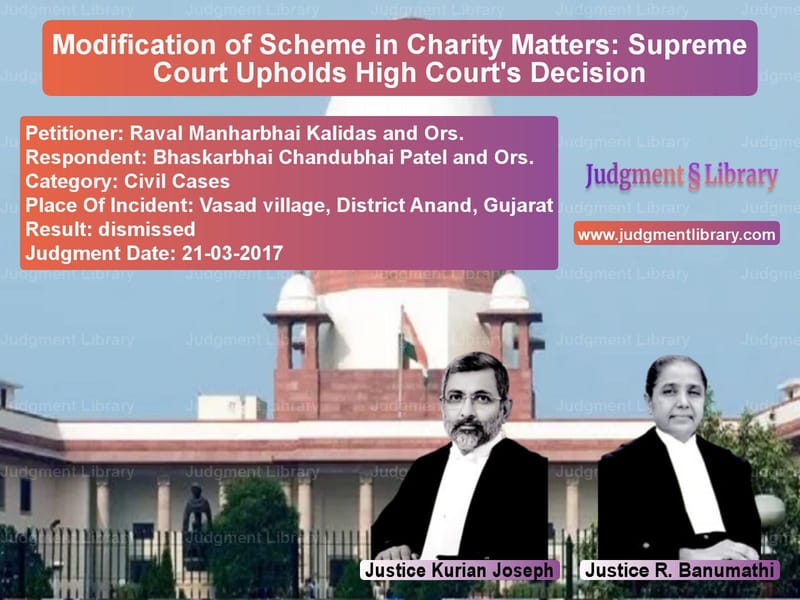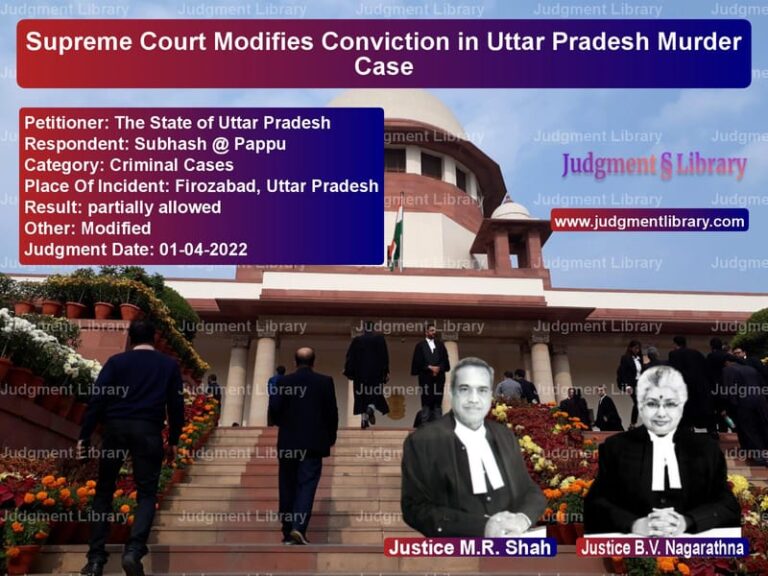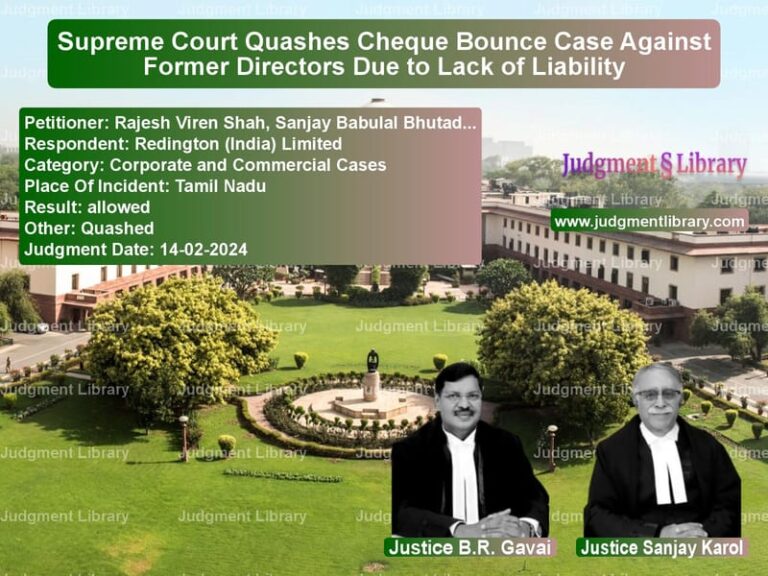Modification of Scheme in Charity Matters: Supreme Court Upholds High Court’s Decision
The case of Raval Manharbhai Kalidas and Ors. v. Bhaskarbhai Chandubhai Patel and Ors. is a significant judgment dealing with the modification of a scheme formulated by the Joint Charity Commissioner in a public charity matter. The appellants challenged the modifications made by the High Court to the scheme, arguing that affected parties had not been properly heard before such modifications. The Supreme Court intervened, examining the procedural aspects of the case and ultimately dismissing the appeals. The Court upheld the High Court’s decision and provided guidance on how public notices should be handled in similar cases going forward.
Background of the Case
The dispute arose when the Joint Charity Commissioner formulated a scheme regarding the management of a charity trust. However, the High Court later modified this scheme, leading the appellants to challenge the modification. Their key contention was that the modifications were made without giving all affected parties an opportunity to be heard. They argued that a public notice should have been issued to ensure that the modifications were communicated to the concerned villagers, who would be affected by the changes in the scheme.
The appellants argued that the absence of a public notice violated the principle of natural justice. On the other hand, the respondent (Bhaskarbhai Chandubhai Patel and Ors.) contended that the modifications were made with the consent of the parties who appeared before the High Court. The matter was eventually brought before the Supreme Court to decide whether the High Court’s decision was justified and whether the modification process had followed the due procedure.
Petitioners’ Arguments
The appellants raised several arguments in their petition:
- The modification of the scheme by the High Court was done without properly hearing all affected parties, including the villagers who would be impacted by the changes.
- They contended that a public notice should have been issued under Order I Rule 8 of the Civil Procedure Code (CPC) to inform the villagers of the proposed changes and give them an opportunity to file objections.
- The modification process lacked transparency and did not comply with legal norms regarding public participation in the alteration of schemes affecting a large number of people.
Respondents’ Counterarguments
The respondent’s legal counsel argued that:
- The modifications made by the High Court were in the best interest of the charity trust and were done with the consent of the parties present in court.
- The High Court’s modifications were thoroughly discussed and were implemented for the better functioning of the trust, ensuring the proper management of the charity.
- There was no need for a public notice since the modifications had already been discussed with the relevant parties before the court, and no objections were raised at that time.
Supreme Court’s Judgment
The Supreme Court, comprising Justices Kurian Joseph and R. Banumathi, carefully examined the case. After hearing both parties, the Court made the following observations:
- While the Court acknowledged the petitioners’ concerns about the lack of a public notice, it noted that the High Court had already ordered a notice to be published, allowing the villagers an opportunity to file objections.
- The Court emphasized that the High Court had considered the objections raised by the parties before it and had modified the scheme only in the better interests of the trust.
- The Court referred to its previous judgments and held that in cases involving public schemes, modifications made with the consent of the parties appearing before the Court are valid, as long as they do not adversely affect the public or violate any established legal procedures.
- Given that the High Court had already addressed the objections and modified the scheme in the interest of the trust, the Supreme Court found no reason to interfere with the judgment.
- The Court also noted that the appellants had not filed objections before the Charity Commissioner, and the public notice issued by the petitioners did not attract any responses from the villagers. Therefore, the issue of procedural fairness had been sufficiently addressed.
As a result, the Supreme Court ruled:
- The appeal was dismissed, and the High Court’s judgment, modifying the scheme, was upheld.
- The petitioners were directed to issue a public notice at their expense, within three days of the judgment, giving time for villagers to respond within 10 days.
- The Court clarified that the notice should be published in two Gujarati newspapers, ‘Gujarat Samachar’ and ‘Sandesh’, which have wide circulation in the village of Vasad, District Anand, Gujarat.
- The election process for the trust’s management was directed to be held within four weeks of the High Court’s decision, with all parties allowed to enroll as per the High Court’s judgment by April 10, 2017.
- The interim arrangement made by the High Court would continue until the election process was completed.
- The pending applications were disposed of, and there were no orders regarding costs.
Key Legal Takeaways
This ruling clarifies important legal principles related to public notices and modifications in charity matters:
- Public Notice Requirement: In cases involving public schemes, a public notice should be issued when modifications are made that could impact a large number of people. This ensures transparency and the right to be heard.
- Consent of Parties: Modifications made with the consent of the parties appearing before the Court are valid, even without a public notice, as long as there are no objections from the public or affected individuals.
- Judicial Oversight in Public Matters: Courts play an essential role in overseeing the fairness and transparency of decisions involving public interest, particularly when modifications are made to existing schemes.
Implications for Future Cases
This case serves as an important precedent for similar cases involving the modification of public schemes and charity matters:
- It reinforces the importance of public participation and notice in matters that affect large communities.
- It also establishes that judicial oversight in such cases is critical to ensure fairness and transparency in decision-making.
- The judgment emphasizes the need for an equitable approach to modify schemes for the betterment of the public trust.
Conclusion
The Supreme Court’s decision in Raval Manharbhai Kalidas and Ors. v. Bhaskarbhai Chandubhai Patel and Ors. reaffirms the importance of transparency, public participation, and procedural fairness when modifying schemes that affect large sections of the public. By upholding the High Court’s decision and ordering the publication of a public notice, the Court ensured that the interests of all parties were protected, and that the modification of the charity scheme was done in a lawful and equitable manner.
Don’t miss out on the full details! Download the complete judgment in PDF format below and gain valuable insights instantly!
Download Judgment: Raval Manharbhai Kal vs Bhaskarbhai Chandubh Supreme Court of India Judgment Dated 21-03-2017.pdf
Direct Downlaod Judgment: Direct downlaod this Judgment
See all petitions in Contract Disputes
See all petitions in Property Disputes
See all petitions in Specific Performance
See all petitions in Judgment by Kurian Joseph
See all petitions in Judgment by R. Banumathi
See all petitions in dismissed
See all petitions in supreme court of India judgments March 2017
See all petitions in 2017 judgments
See all posts in Civil Cases Category
See all allowed petitions in Civil Cases Category
See all Dismissed petitions in Civil Cases Category
See all partially allowed petitions in Civil Cases Category







